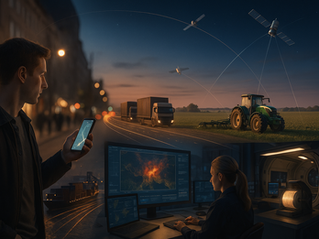Advancing Frontiers with Space Technology
- Phystroid

- Jul 19, 2025
- 3 min read
Updated: Jul 22, 2025
Space technology is revolutionizing our understanding of the universe. Innovations in this field not only enhance our capability to explore outer space but also bring forth transformative benefits on Earth. As we delve into the major advancements, it becomes apparent that space technology has the potential to solve some of the pressing challenges faced by society today.

The Evolution of Space Innovation
The journey of space innovation began with basic rocketry and has since evolved into a complex intersection of science, engineering, and technology. From the launch of Sputnik in 1957 to the Mars Rover missions, each step has built on the knowledge of the previous generation.
Today, we harness advanced robotics, artificial intelligence (AI), and satellite technology to gather data and improve communication. For instance, satellite imagery is vital for weather forecasting, agricultural planning, and disaster management. The information gathered from these satellites equips governments and organizations to make informed decisions, ultimately enhancing public safety and resource management.

Exploring New Opportunities with Space Innovation
The idea of commercializing space may have sounded futuristic just a few years ago, but it is now becoming a reality. Companies like SpaceX and Blue Origin are pioneering efforts to make space travel accessible to the masses. Their reusable rocket technology not only lowers the cost of launch but also opens new avenues for scientific research and tourism.
Moreover, the rise of private enterprises in space exploration indicates a significant shift in the industry. For instance, asteroid mining is no longer a mere fantasy; it is now an area of active research. The potential to harvest resources from asteroids could mitigate resource scarcity on Earth. This innovation promises to unlock untapped billions in precious materials, changing the economic landscape dramatically.
Who is leading in space technology?
Several nations spearhead advancements in space technology, with the United States leading the charge. NASA, alongside private companies, pushes the boundaries of what's possible in space exploration. The Artemis program aims to return humans to the Moon by 2024 and establish a sustainable presence by the end of the decade.
China is also making significant strides with its ambitious lunar and Mars missions, highlighting the country's commitment to become a leading space power. As other countries ramp up their capabilities, including India with its ISRO missions, a new era of international collaboration and competition in space has emerged.

The Role of Space Technology in Everyday Life
While the exploration of outer space is awe-inspiring, it is the practical benefits for Earth that stand out. Technologies developed for space missions find everyday applications here on our planet.
GPS technology, which originated from military satellites, has revolutionized navigation, impacting everything from personal commuting to large-scale logistics and delivery systems. Remote sensing technologies help in urban planning, environmental monitoring, and even climate change initiatives.
The innovations in telecommunications stemming from space technology have enabled instant global communication. With satellites orbiting Earth, people across the globe can connect in real time, breaking down geographical barriers.
Future Prospects in Space Innovation
The horizon for space innovation is ever-expanding. As we delve deeper into the possibilities that space holds, the integration of perspectives from various industries will be crucial. Collaborations between governmental agencies and private firms are likely to define the future of space exploration.
Emerging technologies like 3D printing are set to make space missions more efficient. Imagine building habitats on Mars using materials found on-site rather than launching everything from Earth. This innovative approach will enhance sustainability in space travel.
As we move forward, we must remain vigilant about the ethical challenges that come along with these advancements. Issues such as space debris management, satellite surveillance, and planetary protection need to be addressed to prevent exploitation and ensure that space remains a realm for discovery, not conflict.
In conclusion, the advancements in space innovation cannot be overstated. The impact of these technologies on Earth's society is profound, ranging from improved living standards to enhanced safety. As we stand on the brink of a new era in space exploration, the responsibility to use these innovations wisely falls on humanity as a whole. Embracing the potential of space technology will undoubtedly lead us to an exciting future.












































































































Comments